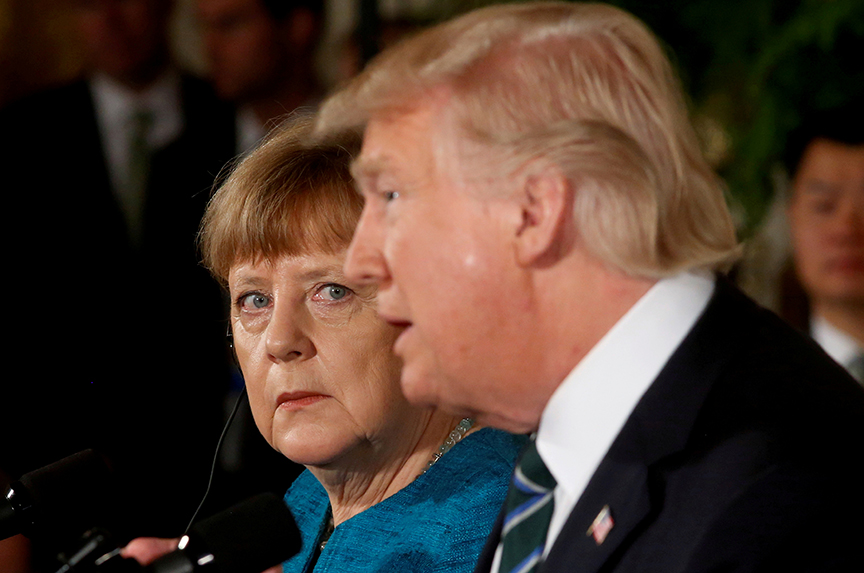 When German Chancellor Angela Merkel arrives in Washington on April 27 for her second visit since US President Donald J. Trump took office, she will not be weary of pointing out the common democratic values that Europe and the United States share and cherish. Trump will equally not be weary of showing his genuine disinterest for such arguments.
When German Chancellor Angela Merkel arrives in Washington on April 27 for her second visit since US President Donald J. Trump took office, she will not be weary of pointing out the common democratic values that Europe and the United States share and cherish. Trump will equally not be weary of showing his genuine disinterest for such arguments.
Thus far, Merkel has bypassed the fact that Trump views world affairs through the lens of hard-edged national self-interest, which resonates strongly with his domestic electoral base, instead of through the prism of a rules-based, international order with Europe and the United States as its guarantors.
In short: for the Trump administration, Germany is a good partner as long as it can deliver—values and “globalist” assumptions notwithstanding.
This rift in perception has grave consequences for the range of topics on Merkel’s agenda for her White House meeting with Trump on April 27: the survival of the Iran nuclear deal, the way forward with Russia, and the imminent decision of the Trump administration on whether to lift steel and aluminum tariff exemptions on the European Union.
Trump may well ask: Why should the United States invest in a values-based partnership that has hitherto appeared to be of little use in pursuing his agenda at home and abroad? What do these shared values add in efforts to denuclearize the Korean Peninsula? How does free speech in Germany create more jobs in the Midwest?
The transatlantic community has yet to bridge the strategic dilemma of protecting the beliefs that underpin this partnership and adapting to the reality that the Trump administration has started to review—quite literally—the worth of traditional alliances.
Not giving in to Trump’s zero-sum game thinking in international affairs while advancing a working relationship with the United States is an ongoing mission for the German chancellor. Leaders in the European capitals are learning the hard way that democracies based on similar fundamental rights and freedoms do not self-evidently agree on fundamental policies.
Instead of only appealing to a historic German-American friendship rooted in the Cold War era, Merkel should focus on bringing tangible policy proposals to the negotiation table. Trump will only listen if the pay out of those initiatives promises to be substantial.
There is a plethora of unrealized potential for closer cooperation between the two sides of the Atlantic. No other two regions across the globe share such great overlap in interests as Europe and the United States.
In the realm of security policy, the recent debate on the future of NATO has been dealing almost exclusively with Europe’s needs—surely for good reason, as the continent is surrounded by a belt of instability and conflict. The logic behind the Alliance has always been that the security of European allies serves US interests. And again, Trump has proven his disinterest for such geostrategic logic. He will abandon the argument if it doesn’t carry immediate and concrete gain for his foreign and domestic agenda.
To underline for him that the security dimension of the transatlantic partnership is reciprocally beneficial, Merkel should turn the table and publicly declare that the long-range missile threat originating from North Korea is a concern and danger to the transatlantic alliance’s collective defense. A dual-track approach of using the diplomatic window of opportunity while keeping up the pressure on Pyongyang might help avoid past mistakes in handling North Korea’s nuclear ambitions. North Korea’s military capabilities pose a threat to the US homeland, and European leaders should push to declare this a topic for discussion at the NATO summit in Brussels in July.
Above all, Merkel should announce that meeting Germany’s obligation to spend two percent of its GDP on defense will be a priority in the scheduled budget negotiations back home—and let words become deeds.
The looming trilateral trade war between Europe, North America, and China is of special concern to the heavily export-driven German economy. To exit the vicious circle of retaliatory tariffs Germany should lobby the European Union to join the United States in its criticism of China’s unfair trade practices, especially when it comes to the violation of intellectual property rights and technology theft. This state-organized shoplifting hurts both Silicon Valley and the German “Mittelstand.”
A joint transatlantic effort would strengthen cohesion within the alliance, show unity against trade malpractices, and steer the EU away from Trump’s fury. Furthermore, such a joint mandate would keep Trump’s tendencies to undermine the World Trade Organization’s rulebook in check. Merkel should hold Trump to his word and propose a new generation of free trade agreements to channel his rage about trade imbalances into a constructive dialogue and concrete—electorally sellable—outcomes.
Merkel will not arrive in Washington celebrated as “the leader of the free world,” as some commentators labeled her in the immediate aftermath of Trump’s election in 2016. Still, she is the longest-serving of the major world leaders, has worked closely with two previous US presidents, and has a track record of adapting to changing circumstances.
Instead of choosing to simply overwinter a presidential tenure that could stretch for the next six years, Merkel should change strategy and go on the offense by introducing initiatives that reach beyond damage control and the proclamation of common values.
Jacob Schrot is chairman of the Association of Parliamentary Staffers on Foreign and Security Policy in the German Bundestag and founder of the Initiative junger Transatlantiker / Young Transatlantic Initiative. Follow him on Twitter @Jacob_Schrot.
Image: German Chancellor Angela Merkel and US President Donald J. Trump, seen here at the White House in Washington on March 17, 2017, will meet again in Washington on April 27. (Reuters/Jonathan Ernst)
